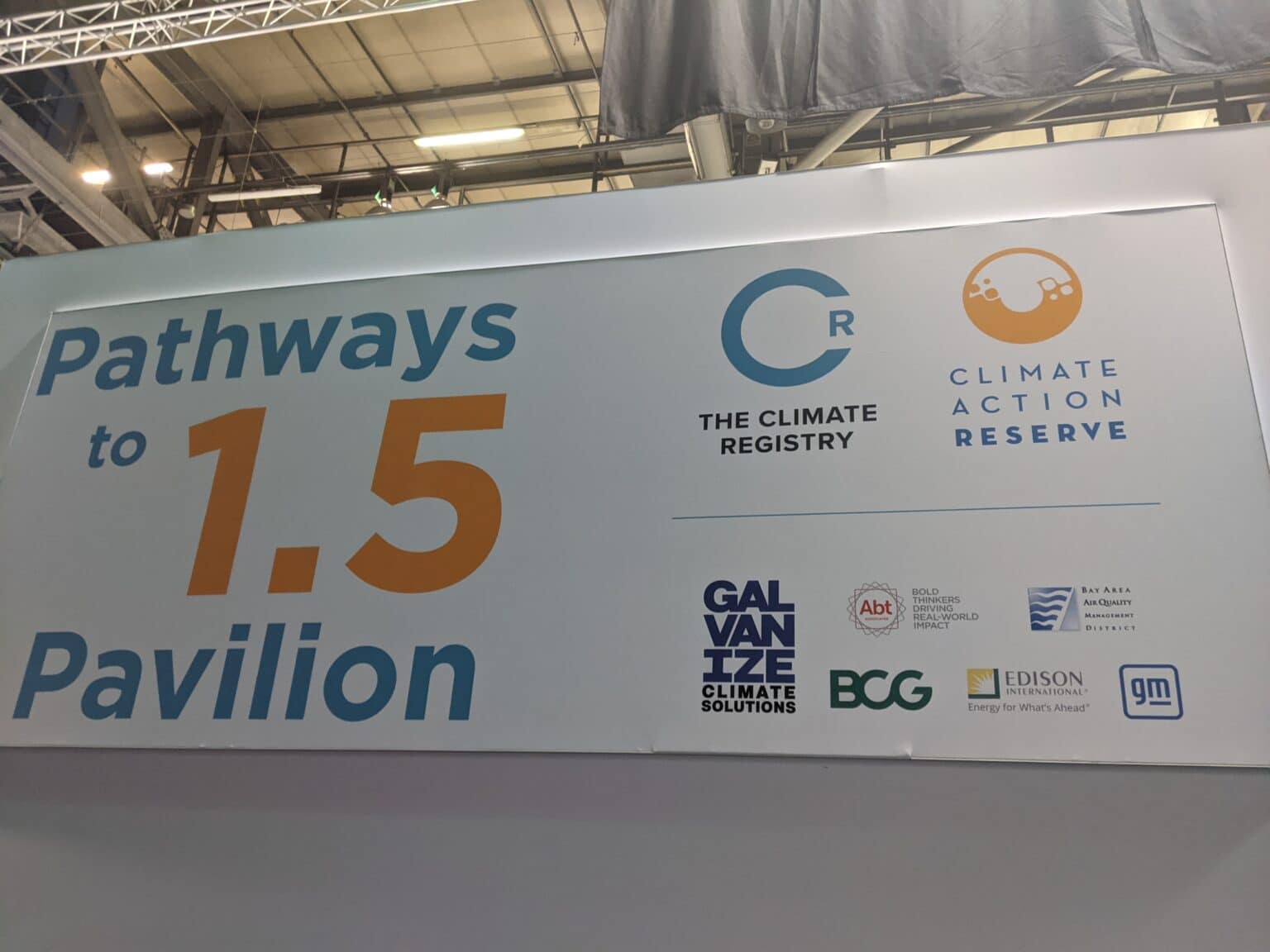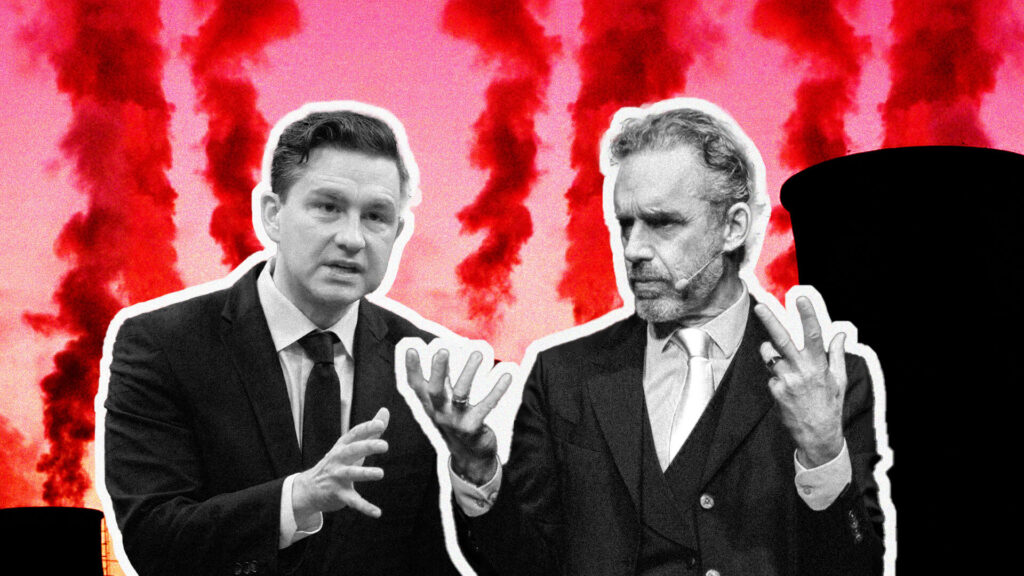GLASGOW, SCOTLAND — A U.S car giant with a history of funding climate denial and inaction is sponsoring a COP26 events space that showcases a “transition to a cleaner world”.
General Motors, one of the world’s largest industrial corporations, is backing the “Pathways to 1.5” pavilion at the Glasgow summit, which explores how businesses can reach the Paris Agreement target of restricting global heating to 1.5°C by the end of the century.
And while companies must play a role in decarbonising the economy, critics are sceptical that GM’s sponsorship may be nothing more than greenwashing. “What makes GM special enough to be warranted this association with ‘pathways to 1.5?’” asked Geoffrey Supran, research associate in the Department of the History of Science at Harvard University and director of Climate Accountability.
The pavilion, which is being run by Climate Action Reserve (CAR) and voluntary greenhouse gas reporting programme The Climate Registry, is one of dozens of corporate-style event spaces run by a mixture of governments, businesses, NGOs and civil society organisations in the official “Blue Zone” where negotiations — which are restricted to government delegations — and a variety of side-events are being held.
“General Motors is not an anomaly in being a highly polluting corporation invited into COP26,” Cat Scothorn, from campaign group Glasgow Calls Out Polluters, told DeSmog.
DeSmog recently revealed the extent of fossil fuel influence among delegates at the summit, despite the UK government publicly excluding international oil companies from any official role.
“Governments have allowed large polluters into the conference to greenwash themselves and pretend industries are acting on climate when actually they plan to pursue profit ‘till it kills us all.”
Fuelling Disinformation
Earlier this year General Motors (GM) pledged to stop making diesel and gas vehicles by 2035, and to reach carbon neutrality, with the help of carbon offsets, by 2040.
Campaigners, however, say that GM should be excluded from the crucial climate summit. Up until 2020, the car giant lobbied former U.S. President Donald Trump for weaker fuel efficiency standards in the U.S.
And last year, E&E News revealed that the Michigan-based car company was aware as early as the 1960s of the potential climate risks stemming from burning fossil fuels that power their vehicles.
What’s more, both Ford and GM donated to conservative think tanks and organisations disseminating disinformation on climate in the late 1980s and early 1990s, engaging in campaigns to downplay climate risks and misrepresent risks.
An analysis by think tank InfluenceMap, which tracks corporate climate lobbying, also notes that GM is a member of a number of industry associations which have lobbied against climate action, including the Alliance of Automobile Manufacturers (Auto Alliance), Business Roundtable, National Association of Manufacturers, and Society of Motor Manufacturers and Traders, the UK’s principal trade association for the UK’s automotive sector.
Corporate Interest
The “Pathways to 1.5” pavilion is hosting a number of events and talks over the 12 day summit. These have featured a number of high-profile figures, such as John Kerry, the U.S. special presidential envoy for climate, national climate advisor Gina McCarthy, and actor Brian Cox.
Craig Ebert, president of CAR, told DeSmog it “aims to highlight actions at the state and local level to reduce greenhouse gas emissions and “showcase the wide variety of efforts to transition to a cleaner world”.
But alongside GM, the pavilion’s sponsors also include management consulting firm Boston Consulting Group (BCG), which has undertaken extensive work with the oil and gas industry.
BCG was awarded a controversial £1 million contract to help organise the climate summit, a move criticised by campaigners due to its ties to fossil fuels.
According to its own website, BCG has “extensive experience working with leading upstream oil and gas clients worldwide” and that its experts have advised “19 of the world’s 25 leading oil companies on some of their most pertinent strategic challenges”.
A BCG spokesperson said the company partners with clients “in sectors where abatement is most difficult or where emissions are greatest” and “help them find solutions that will spark the greatest change and speed up progress toward net zero”.
“We don’t work for clients who are openly indifferent or in denial of climate change,” they added.
Meanwhile, another sponsor of the pavilion, Edison, the electric power provider and utility company, is progressively phasing out fossil fuel generation. However, they appear to have had ties to the trade association Edison Electric Institute (EEI), which has played a leading role in opposing rooftop solar production in the U.S.
According to the DeSmog’s database profile of the organisation, Theodore F. Craver, former president and CEO of Edison International, also served as EEI’s chair between 2012-2015. The company also currently participates in EEI’s environmental, social and governance (ESG) initiative “to provide investors and other stakeholders with relevant and easily accessible ESG data”.
‘Baby Steps’
Ebert said CAR was “happy to have General Motors as a sponsor”.
“I have been working on climate issues for nearly 35 years now and a key challenge has always been to get countries/states/provinces/cities, and companies to take the climate challenge more seriously,” he told DeSmog via email.
“The entire global automotive industry is undergoing a major transformation at this very moment. I welcome anyone to the climate fight; the transformation to a low/no carbon economy will require aggressive action across the globe and there is no time to waste.”
“There obviously needs to be space in climate policy discussions to accommodate companies that meaningfully commit to transforming their business models,” acknowledged Supran.
But, he continued, “It’s not clear to me that companies taking baby steps towards climate action deserve the green sheen of playing with the big kids who are leading the way. Perhaps there should be a sandbox in the 1.5 Pavilion for those just getting going.”
General Motors has been approached for comment.
UPDATED 09/11/21: The article has been updated to include a comment from BCG.
Subscribe to our newsletter
Stay up to date with DeSmog news and alerts







